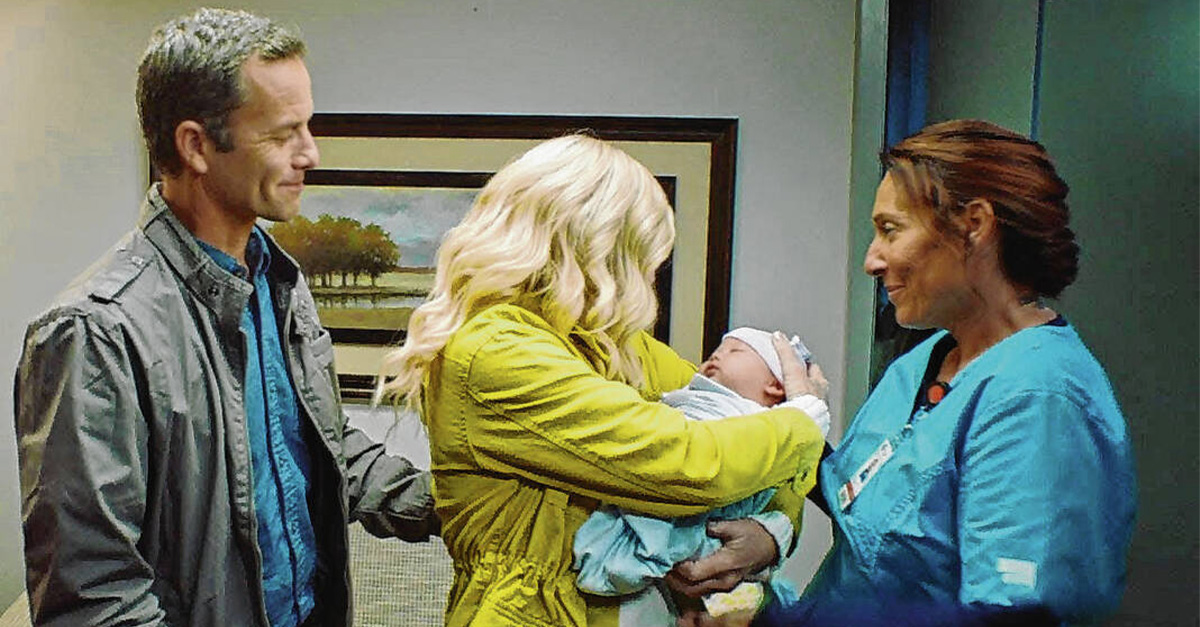


Get a free copy of Parental Rights & Education when you subscribe to our newsletter!

“Scripture says that God forms us in the womb. He is the one who breathes life into us. We believe life is precious and that we are as, Proverbs says, to defend those who cannot defend themselves.”
–ALEX KENDRICK, FILM PRODUCER
The film, entitled “Lifemark,” is a film adaptation of the heartwarming reuniting of David Scotton with his birth mother, Melissa Coles, as well as his birth father, Brian Nicholas. Starring Kirk Cameron, “Lifemark” took in over $2 million on its opening weekend.
What made this showing even more impressive is that the adoption story of David Scotton is already well-known in Christian and pro-life circles, having been the subject of a short film documentary called “I Lived on Parker Avenue.”
On first glance, the story doesn’t seem that unusual for an adoption story. Coles became pregnant with David when she was 18, still in high school, and Nicholas was 17. The two were frightened and felt unprepared and unable to take care of a child.
But then came the twist. Melissa and Brian decided to end the pregnancy and, together, they drove to an abortion clinic in Indianapolis. Workers at the clinic came out and draped a blanket over Melissa’s head and played loud music to try to block the prayers and calls of the nearby protesters. Before Melissa was whisked inside, however, she heard one protestor cry out to her, “That baby has 10 fingers and 10 toes, and you’re going to kill it.”
Those words stuck with Melissa as she first sat and then was asked to lie down on the table. The doctor came in and prepared to perform the abortion. As he moved towards her and touched her gown, Melissa suddenly exclaimed, “I can’t do this.” The doctor rolled his eyes and threw away his gloves, while Melissa ran out of the clinic. That night, Melissa made the firm decision to let her child live.
That child was adopted by Jimmy and Susan Scotton, a Louisiana couple who desperately wanted him. Susan had already experienced the loss of her two sons to a fatal genetic disorder. When David was born, he found a loving family with the Scottons.
Eighteen years later, Melissa decided to update her contact information with the adoption agency just in case her child decided he wanted to contact her. That led the two to connect and, about a year later, the emotional meeting of David and his birth parents was told for the first time in the short-film documentary “I Lived on Parker Avenue.” The film is a moving picture of the love that grew exponentially and impacted so many people because Melissa chose to allow David to live.
The film shows the beauty of forgiveness, gratitude, and redemption as Melissa and Brian both meet David and the Scottons, all of whom are simply thankful that the two gave David life and allowed him to become a member of the Scotton family. Melissa and Brian both experienced having the weight of nearly 20 years of guilt lifted off of their shoulders and the fear that their son would hate them relieved. Neither had ever even told their parents about David.
After seeing “I Lived on Parker Avenue,” Christian actor Kirk Cameron contacted David to tell him that the story had to be made into a movie. Cameron, who plays Jimmy Scotton, reunited with the film producing team of Alex and Stephen Kendrick after having played the main character in their film “Fireproof” to tell David’s story on the big screen.
Despite many theater owners being afraid to play the film because of its pro-life message, Fathom Events agreed to show “Lifemark” in over 1,400 theaters the week of September 9-15. The movie, with its $2 million in box office sales over the weekend, is Fathom’s highest grossing event this year and currently has a 97 percent audience score. “We’re thrilled at the numbers we’re seeing for LIFEMARK this past weekend. They not only represent a big success for Fathom, The Kendrick Brothers, and Kirk Cameron Entertainment, but they also go to show the value that faith-based content brings to both theater owners and moviegoers alike,” said Ray Nutt, CEO of Fathom Events.
Stephen Kendrick said, “It is such a beautiful thing when our hearts start beating along with God’s heart in valuing the orphan and caring for them. God is a Father to the fatherless and He places the lonely into families. He created not only the family, but He created adoption.”
Alex Kendrick said that the story of David Scotton, who is now an attorney and a frequent speaker at pro-life events, shows the truth of Psalm 139. “Scripture says that God forms us in the womb. He is the one who breathes life into us. We believe life is precious and that we are, as Proverbs says, to defend those who cannot defend themselves,” said Alex Kendrick.
Adoption is also personally meaningful to the Kendricks and Cameron, as they all have adopted children.
“I’m passionate about this because I have four adopted children,” Cameron said. “My wife, Chelsea, and I, we met and got married on the set of ‘Growing Pains.’ We started this great big family by adopting our kids. Why did we do that? Well, my wife is herself an adopted child. So, think about this. My wife was one doctor appointment away from not existing. And our four children were also this close to not existing, and if my wife hadn’t been born, neither would our two natural-born children. So, all six of our kids and my wife wouldn’t be here if people didn’t value their life while they were in the womb so that they could grow into these beautiful, amazing people that they are.”
The film will be in theaters through Thursday, and we highly encourage all to go see it if possible. It will also likely be available at some point on DVD and shown in other venues. In the meantime, for those who want to learn the wonderful true story behind the film in the words of those who lived it, you can watch it here:
Ready to dive deeper into the intersection of faith and policy? Head over to our Theology of Politics series page where we’ve published several long-form pieces that will help Christians navigate where their faith should direct them on political issues.

Notifications